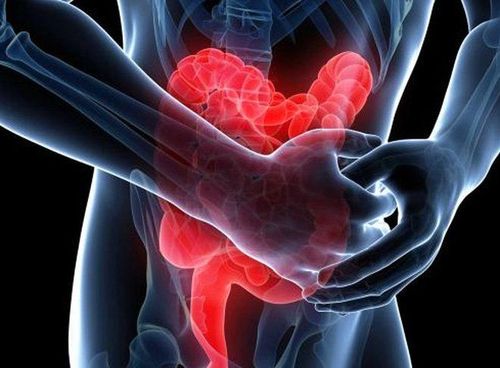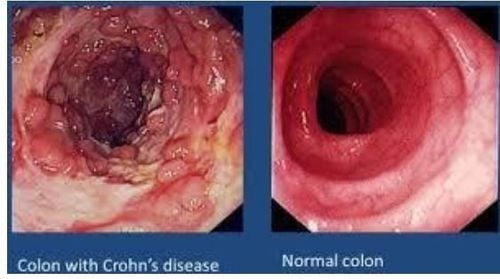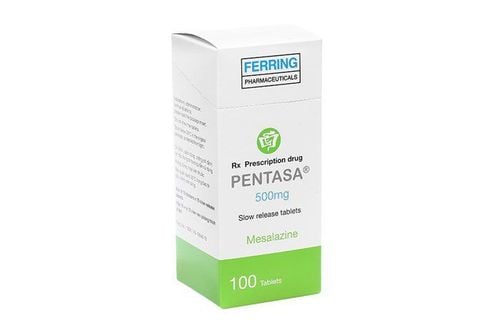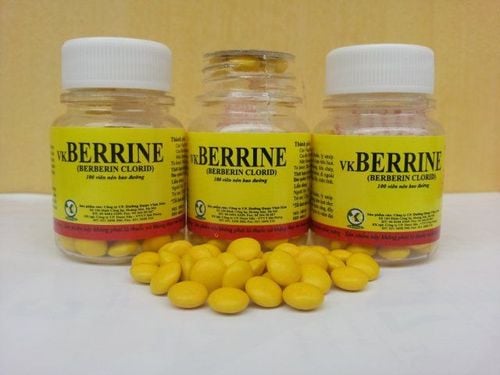This is an automatically translated article.
Post by Master, Doctor Mai Vien Phuong - Department of Examination & Internal Medicine - Vinmec Central Park International General HospitalCurrently known factors likely to cause secondary inflammatory bowel disease are medications, bowel surgery, and transplants of organs, stem cells, or fecal microbiota. Drugs implicated in the development of secondary inflammatory bowel disease include: Immunomodulators, alpha anti-tumor necrosis agents, anti-interleukins, interferons, immunostimulants, and checkpoint inhibitors.
.
1. Inflammatory bowel disease secondary to drugs
It is not surprising that drugs that alter host immunity can sometimes lead to the development of new-onset inflammatory bowel disease, also known as “secondary inflammatory bowel disease”. due to drugs”. These drugs mainly include: Immunomodulators and biologic agents. A newer class of drugs called checkpoint inhibitors are also used to treat melanoma and have a similar but weaker association with the use of immunostimulants.2. Inflammatory bowel disease caused by Interferon
Interferons (IFNs) are glycoprotein molecules secreted by host cells in response to viral infections and act as cytokines during inflammatory episodes. They inhibit viral replication by inducing an immune response through the activation of antigen-presenting cells, natural killer cells, neutrophils, and lymphocytes.IFNα has been used to treat hepatitis B or hepatitis C infections. However, due to the current use of highly effective direct-acting antivirals, IFN has largely fallen out of favor. In some cases, IFN is used to treat multiple sclerosis, certain types of lymphoma, and leukemia.
There are many reported cases of people with chronic hepatitis C infection who developed new-onset ulcerative colitis following treatment with IFNα-based therapy. 1 case of HCV and HIV co-infection was reported to develop Crohn's disease following IFN therapy. All of these reported cases were reactive to 5-aminosalicylic acid compounds or corticosteroids. IFNα tends to stimulate helper-1 T cells that play an important role in the pathogenesis of several immune-mediated disorders. This immune response in the gut may be responsible for the development of new-onset inflammatory bowel disease.

3. Enteritis secondary to immune stimulants
Some suggest that Crohn's disease is related to a weakened immune system rather than overactivity. The immunodeficiency hypothesis can be used to explain the higher propensity to develop inflammatory bowel disease in individuals with inherited immune disorders such as Wiskott-Aldrich syndrome or glycogen storage disorders.Cellular cytokines such as monocyte-stimulating factor (GM-CSF) and hematopoietic stem cells in the bone marrow. Helps in the generation and maturation of granulocytes and monocytes, which play a role in innate immunity.
3.1 Animal studies Animal studies have shown that mice with increased levels of anti-GM-CSF antibodies have decreased neutrophil phagocytosis. Defects in the innate mucosal defenses of the gut may lead to an increased risk of inflammatory bowel disease.
In addition, GM-CSF deficiency together with region 2 nucleotide-linked oligomerization mutations also attenuated the innate immune response, leading to bacterial colonization of the stroma. These bacteria in turn stimulate specific intestinal T lymphocytes. These activated T cells produce several inflammatory markers that may lead to the development of inflammatory bowel disease in predisposed individuals.
3.2 Association between GM-CSF and inflammatory bowel disease Some clinical evidence suggests an association between GM-CSF and inflammatory bowel disease. An Australian study of patients with inflammatory bowel disease found that antibody levels to GM-CSF were higher in the Crohn's disease cohort than in the ulcerative colitis group.
Overall, antibody levels were significantly higher in the inflammatory bowel disease group than in the control group. The presence of anti-GM-CSF antibodies is suggestive of disease status and antibody titers can be used as a prognostic marker for disease activity, especially in the case of Crohn's disease.
A familial association with this antibody production has been described in individuals with a family history of ulcerative colitis or Crohn's disease. Anti-GM-CSF antibodies were found to be associated with increased intestinal permeability and bacterial translocation, which is associated with a higher likelihood of developing inflammatory bowel disease flare-ups.

Please dial HOTLINE for more information or register for an appointment HERE. Download MyVinmec app to make appointments faster and to manage your bookings easily.
ReferencesGhouri YA, Tahan V, Shen B. Secondary causes of inflammatory bowel diseases. World J Gastroenterol 2020; 26(28): 3998-4017 [PMID: 32821067 DOI: 10.3748/wjg.v26.i28.3998] Ray G. Inflammator bowel disease in India - Past, present and future. World J Gastroenterol. 2016;22:8123-8136. [PubMed] [DOI] [Cited in This Article: 1] [Cited by in CrossRef: 23] Dombal FT, Watts JM, Watkinson G, Goligher JC. Incidence and management of anorectal abscess, fistula and fissure, in patients with ulcerative colitis. Dis Colon Rectum. 1966;9:201-206. [PubMed] [DOI] [Cited in This Article: 1] [Cited by in CrossRef: 40] [Article Influence Tracking in F6Publishing: 0.7]














